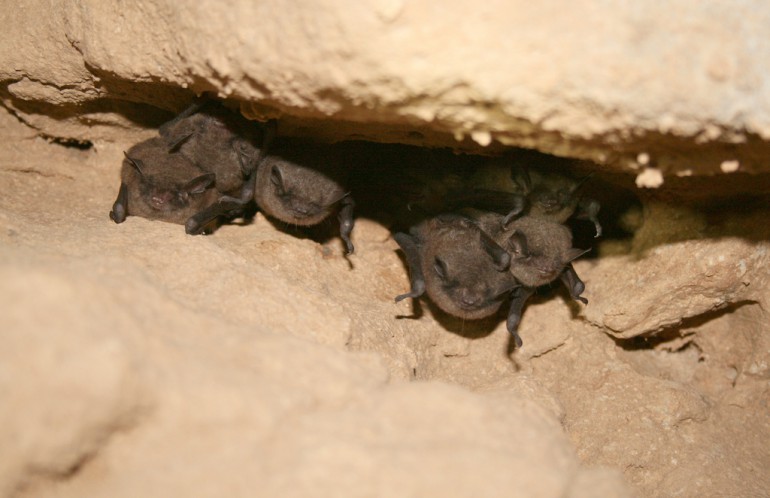Habitats in Kent for Native Bat Populations
There are plenty of bats in Kent, and it only takes one to affect the progress of your development. Getting planning permission for a development site that contains a bat roost isn’t easy, but it’s far from impossible. One thing that you will need to satisfy your local authority’s development control department is bat surveys.
Kent is home to 14 of the 18 bat species native to the UK, ranging from the common pipistrelle to the greater horseshoe bat – an exceptionally rare species that recently returned to the county after an absence of over 100 years. Local authorities are eager to protect them and reverse the decline we’ve seen in wildlife – including bats – over the last several decades. Dover District Council, in particular, have identified a need to go further than the legal protections offered by law and provisions in the Local Plan.
Consequently, the local council is working closely with partner organisations on the Kent Biodiversity Action Plan to set targets to expand the diversity of habitats, leading to implications for both developers and homeowners seeking to make the most of their site or property.
Bats in Relation to Surveying, Conservation, Compensation and Planning
Kent is growing, and the local authorities have made provisions for significant investment to support this growth in the coming years. A large amount of this investment will likely be targeted at infrastructure, with the Kent and Medway Growth and Infrastructure Framework predicting that £16.4 billion will be needed to develop the county to its full potential.
More schools, roads, healthcare, and so on means further investment from the private sector in the form of business, jobs and homes. With this in mind, Kent County Council and the other local authorities – like Sevenoaks, Canterbury and Maidstone – will likely be quite open to reasonable planning applications. However, it goes without saying that all developers must meet their legal obligations to protect and preserve the local fauna, many of which are in place to reverse the dramatic decline in bats.
Planners will also be balancing the benefits of proposed developments against policy frameworks laid out by the Local Plan and other, region-specific initiatives (often regulated by Natural England and the Bat Conservation Trust) to ensure that bat habitats are preserved or new habitats created as a condition of granting planning consent. Ultimately, as Kent develops, urban centres will further intrude into the grassland, woodland and coastline that dominate the countryside. Here, you’ll find habitats that may have hosted bats as forms of bat roosts for centuries.
Interestingly, some of the bat species in Kent are not found in natural spaces at all; the county’s serotine bat roosts, for example, have only been found inside buildings. Therefore, whether you are planning an urban or rural development that has the potential to disturb a bat habitat, it is sensible to consider scoping bat surveys as soon as possible.

Planning Applications Supported by Phase 1 and 2 Bat Surveys
If you or the local authority recognise that your development potentially poses a risk to bat habitats, the first step is to book a scoping bat survey. Also known as a Preliminary Roost Assessment (PRA), a scoping bat survey involves an ecologist reviewing the site for evidence of bats present, such as bat roosts, bat droppings or prey carcasses, as well as signs of potential roost sites on the property and any natural or man-made features that could act as a suitable bat roost, such as missing roof tiles or gaps in the brickwork, for example.
At this point in bat surveys, they will also look for bats currently residing on the premises. While the assessment can only be carried out during daylight hours, it is otherwise flexible, as it can be conducted all year round, even outside of active season and during bat hibernation between September and May. During the first bat activity survey, if the ecological surveyor in charge of the assessment does find bats, evidence of bats or identifies the site as a suitable habitat for the protected species, your local authority will then expect you to undertake another form of bat survey.
The second stage bat survey is known as a phase 2 bat survey or Bat Emergence and Re-Entry Survey (BERS). During a BERS, an ecologist will monitor the area around the site to determine entry and exit points, potential bat roosts including possible maternity roosts, and the bat species present. To do this, they will carry out the bat activity survey at dusk or dawn and use specialist equipment such as bat detectors to achieve accurate readings. Unlike bat scoping surveys, emergence surveys can only be conducted outside of hibernation and in active season between the months of May and September.
If you choose to not get a bat survey and bats or their habitats are present, or you undertake development in a way that is detrimental to the local bat population, there are serious consequences. Criminal prosecutions for breaching legislation put in place by the UK government in partnership with Natural England to protect bats are not unusual. The penalties range from severe to profound, and they’re not limited to fines. Simply put, you can be sent to prison if you harm bats or otherwise interfere with their habitats without the consent of the local authority.
Comprehensive Advice You Can Trust
Our bat consultants are the best in the business. Every one of them is educated to a bachelor’s or master’s level and is required to pass a rigorous in-house training programme that exposes them to a wide variety of sites. Each ecologist also possesses the relevant licences (class I and II) from Natural England, and if a developer needs a bat mitigation licence in order to relocate bats or destroy potential bat roosts, our team can help with the application process.
Better yet, most of our team works remotely, meaning the bat surveyor who comes to your site will know exactly how things work in your region. It’ll probably be one of our Kent team, who will be well aware of the local interest groups that object to planning applications as a matter of course, and they will know the fine details of the policies that the Kent local authorities use to make their planning determinations.
Speed is central to everything we do; our systems and processes are geared towards you getting a completed bat survey and report in a few days at most. If you’re really up against the clock, you can invest in a weekend appointment or even a next working day report. The combination of speed and expertise results in you getting the bat survey and advice you need to successfully qualify for planning permission, and if for some reason you don’t, we will give you your money back.
Benefit from Our Bat Survey Services
If you want your bat survey to be managed by a local expert and contain all of the advice you need to get planning permission, choose Arbtech. Simply get in touch using the free quote box at the bottom of this page or visit our helpful Contact Us page. We cater to all areas, including Kent and all other parts of South East England, from Berkshire to Hampshire and from Oxfordshire to East Sussex.
Once you’ve filled in your details and given us some information about your site and project, we will be able to book the bat activity surveys, Bat Emergence and Re-Entry Surveys (BERS) and any other protected species surveys you need at a suitable time. Then, we can visit your site to carry out the necessary bat surveys and help you to take the next step in your development.
Likewise, if you would like to learn more information about bat activity surveys, bat scoping surveys, Bat Entry and Re-Entry Surveys (BERS), general bat activity, the further surveys we provide such as protected species surveys, or technical information such as the universal governance from Natural England and the Bat Conservation Trust (BCT) and relevant local ecology from the Kent Bat Group, our knowledgeable team would be more than happy to help.


